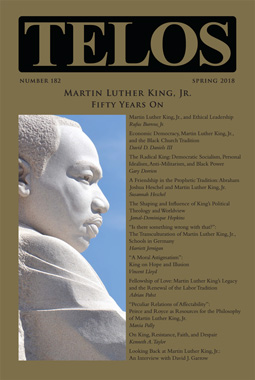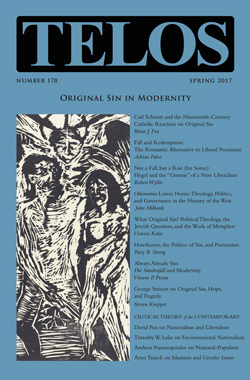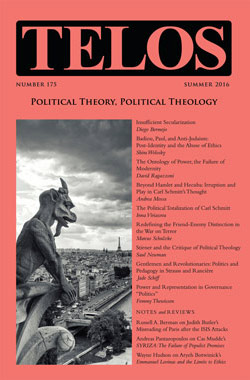By Kenneth D. Johnson · Monday, March 19, 2018 Telos 182 (Spring 2018), a special issue commemorating the life and thought of Martin Luther King, Jr., is now available for purchase in our store.
 1968 was a tough year for the United States and for many around the world. The Tet Offensive in Vietnam started in January, and the My Lai massacre occurred there in March. In Paris, the student uprising started in May. The Prague Spring, during which Czechoslovakian activists sought a measure of greater freedom for their country from the Soviet Union, was crushed by Warsaw Pact military forces in August. Police rioted at the Democratic National Convention in Chicago in August, beating student protestors indiscriminately in the streets. The Weather Underground emerged in October, and black American sprinters Tommie Smith and John Carlos gave their gloved Black Power salute as a protest during the Mexico City Olympics that same month. Richard M. Nixon was elected as president in November. And, there were two pivotal deaths: Robert F. Kennedy in June, and Reverend King in April. After King’s assassination, many U.S. cities erupted in flames as their African American residents protested his killing and the moribund state of civil rights progress at the time of King’s death. 1968 was a tough year for the United States and for many around the world. The Tet Offensive in Vietnam started in January, and the My Lai massacre occurred there in March. In Paris, the student uprising started in May. The Prague Spring, during which Czechoslovakian activists sought a measure of greater freedom for their country from the Soviet Union, was crushed by Warsaw Pact military forces in August. Police rioted at the Democratic National Convention in Chicago in August, beating student protestors indiscriminately in the streets. The Weather Underground emerged in October, and black American sprinters Tommie Smith and John Carlos gave their gloved Black Power salute as a protest during the Mexico City Olympics that same month. Richard M. Nixon was elected as president in November. And, there were two pivotal deaths: Robert F. Kennedy in June, and Reverend King in April. After King’s assassination, many U.S. cities erupted in flames as their African American residents protested his killing and the moribund state of civil rights progress at the time of King’s death.
Continue reading →
Telos 178 (Spring 2017) is now available for purchase in our store.
 “If men were angels, no government would be necessary,” James Madison famously writes in Federalist No. 51. The defectiveness of the human will and the human intellect make government necessary, whether in John Calvin’s Sermon on the Galatians, which Madison echoes, in the locus classicus of this argument, Augustine’s City of God, or in book 9 of Plato’s Laws, which already describes humans’ innate capacity for evil as “a result of crimes long ago.” In modernity, Christian tropes like the Fall and original sin are used not only to justify political power, but also to temper utopian political goals. Reinhold Niebuhr emphasized the latter, for example, when he described the preference of the United States’ purportedly “Calvinist fathers” for relying upon checks and balances rather than the intelligence and goodwill of future American statesmen. Even the most familiar political analyses of original sin and the anthropology of Western Christianity contain this tension between justifying and limiting political power. “If men were angels, no government would be necessary,” James Madison famously writes in Federalist No. 51. The defectiveness of the human will and the human intellect make government necessary, whether in John Calvin’s Sermon on the Galatians, which Madison echoes, in the locus classicus of this argument, Augustine’s City of God, or in book 9 of Plato’s Laws, which already describes humans’ innate capacity for evil as “a result of crimes long ago.” In modernity, Christian tropes like the Fall and original sin are used not only to justify political power, but also to temper utopian political goals. Reinhold Niebuhr emphasized the latter, for example, when he described the preference of the United States’ purportedly “Calvinist fathers” for relying upon checks and balances rather than the intelligence and goodwill of future American statesmen. Even the most familiar political analyses of original sin and the anthropology of Western Christianity contain this tension between justifying and limiting political power.
Continue reading →
By Diego Bermejo · Thursday, July 28, 2016 The process of secularization is insufficient if, voided of its original pathos, it leads to any form of sacralization of the immanence. Secularism becomes insufficient, if not harmful, in the same way as religious fundamentalism, if it becomes an obstacle to building pluralistic coexistence. Therefore, secularism should acknowledge the emergence of religious challenges. Religion has found, in the crisis of reason (metaphysical, scientific, and political), an opportunity not only to be present in the public sphere, but also to demand the right to equal treatment—appealing to the same democratic principles of secularism—and the right to political participation. Secularism cannot respond to these challenges with another form of “enlightened fundamentalism.”
Continue reading →
By Russell A. Berman · Monday, June 13, 2016  Critical theory inherited the mission of philosophy to know the world and to pursue the good life. Careful examination should shed light on the cosmos and our place within it and contribute to a beneficial ordering of human concerns, when wisdom informs governance. Yet that aspiration to know the world encountered the limits of intelligibility, beyond which reason could not proceed. Meanwhile, the efforts to remake the world in the spirit of reason elicited processes of rationalization, as deleterious to the world around us, the natural environment, as to the world within us, the ongoing cultural crisis of modernity and its social corollaries. That is Horkheimer and Adorno’s dialectic of enlightenment at the foundation of the critical theoretical tradition that continues to provide a framework with which to articulate a critique of the contemporary in its many heterogeneous facets: the disruption of all forms of solidarity, the pressures on family structures, the erosion of educational opportunities, the growing gap between rich and poor. Add to this the ominous shifts in the international order, including the breakdown of state structures from North Africa through the Middle East, the strains on the European Union, and the return of a repressive semi-dictatorship in Russia, while—at this point in the presidential election season—the United States seems to be tumbling dangerously toward Weimar conditions. Critical theory inherited the mission of philosophy to know the world and to pursue the good life. Careful examination should shed light on the cosmos and our place within it and contribute to a beneficial ordering of human concerns, when wisdom informs governance. Yet that aspiration to know the world encountered the limits of intelligibility, beyond which reason could not proceed. Meanwhile, the efforts to remake the world in the spirit of reason elicited processes of rationalization, as deleterious to the world around us, the natural environment, as to the world within us, the ongoing cultural crisis of modernity and its social corollaries. That is Horkheimer and Adorno’s dialectic of enlightenment at the foundation of the critical theoretical tradition that continues to provide a framework with which to articulate a critique of the contemporary in its many heterogeneous facets: the disruption of all forms of solidarity, the pressures on family structures, the erosion of educational opportunities, the growing gap between rich and poor. Add to this the ominous shifts in the international order, including the breakdown of state structures from North Africa through the Middle East, the strains on the European Union, and the return of a repressive semi-dictatorship in Russia, while—at this point in the presidential election season—the United States seems to be tumbling dangerously toward Weimar conditions.
Continue reading →
By Vincent Lloyd · Thursday, December 10, 2015 Michel Houellebecq’s novel Submission raises important questions about the cultural crises of modernity. It reflects on the dialectics of post-secularism and post-democracy in ways that have become particularly salient in light of the terror attacks in Paris and San Bernadino. Beginning with Vincent Lloyd’s post today, TELOSscope presents a series of discussions of the novel that will appear over the next several days.
The violence of November 13, 2015, in Paris was met with an avalanche of grief and sympathy from around the world. Similar feelings followed the attack on Charlie Hebdo several months earlier. Paris is an iconic and beloved city; to see blood and bullet holes on the streets of Paris caused pain. Or rather, it causes professions of emotion. In an age of personal mediation, when we are expected to advertise our feelings about world events nearly in real time through tweets and Facebook posts, it is an open question how much feelings are felt—though they are most certainly performed. Affect circulates with ever increasing velocity, but such affect is increasingly shallow, more like a shared way of talking than anything having to do with inwardness. This does not mean mediated emotions are insignificant. As leftist critics of such public mourning charge, shared ways of talking about the world lead to shared ways of seeing the world and can ultimately legitimate violent ways of acting in the world.
Continue reading →
By John Milbank and Adrian Pabst · Thursday, August 14, 2014 We agree with Joshua Ralston that all forms of religious fundamentalism demand both universal and unconditional condemnation as well as regional and global responses to help all the victims—irrespective of their faith. We also agree with him that it is wrong to judge age-old religious traditions by modern secular, liberal standards and that essentialized notions distort complex cultural and historical realities.
Continue reading →
|
|
 1968 was a tough year for the United States and for many around the world. The Tet Offensive in Vietnam started in January, and the My Lai massacre occurred there in March. In Paris, the student uprising started in May. The Prague Spring, during which Czechoslovakian activists sought a measure of greater freedom for their country from the Soviet Union, was crushed by Warsaw Pact military forces in August. Police rioted at the Democratic National Convention in Chicago in August, beating student protestors indiscriminately in the streets. The Weather Underground emerged in October, and black American sprinters Tommie Smith and John Carlos gave their gloved Black Power salute as a protest during the Mexico City Olympics that same month. Richard M. Nixon was elected as president in November. And, there were two pivotal deaths: Robert F. Kennedy in June, and Reverend King in April. After King’s assassination, many U.S. cities erupted in flames as their African American residents protested his killing and the moribund state of civil rights progress at the time of King’s death.
1968 was a tough year for the United States and for many around the world. The Tet Offensive in Vietnam started in January, and the My Lai massacre occurred there in March. In Paris, the student uprising started in May. The Prague Spring, during which Czechoslovakian activists sought a measure of greater freedom for their country from the Soviet Union, was crushed by Warsaw Pact military forces in August. Police rioted at the Democratic National Convention in Chicago in August, beating student protestors indiscriminately in the streets. The Weather Underground emerged in October, and black American sprinters Tommie Smith and John Carlos gave their gloved Black Power salute as a protest during the Mexico City Olympics that same month. Richard M. Nixon was elected as president in November. And, there were two pivotal deaths: Robert F. Kennedy in June, and Reverend King in April. After King’s assassination, many U.S. cities erupted in flames as their African American residents protested his killing and the moribund state of civil rights progress at the time of King’s death. 



